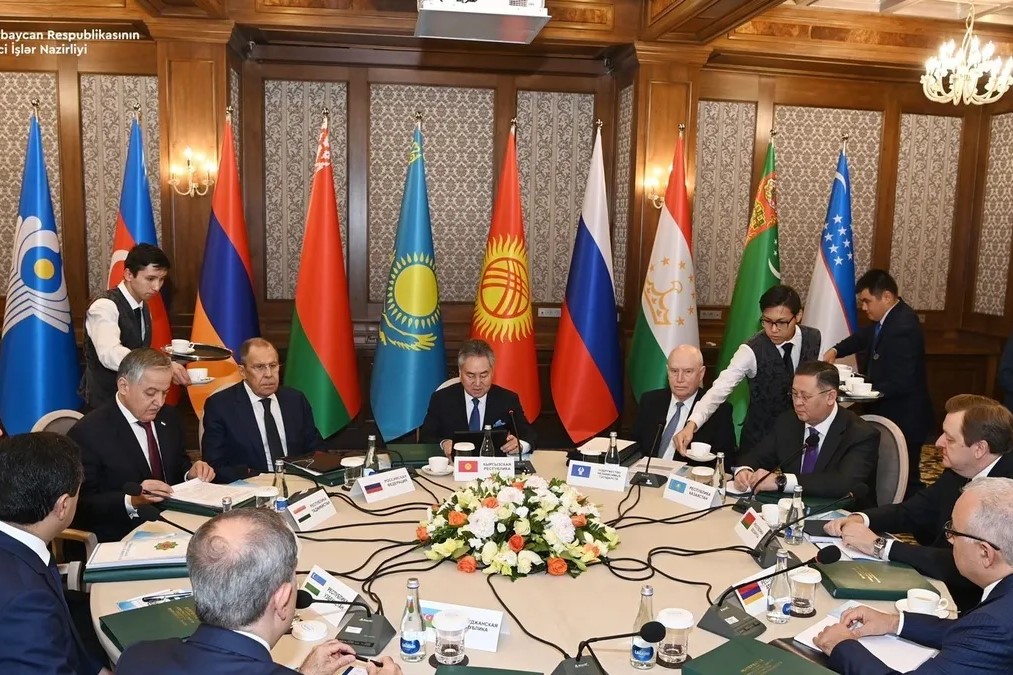
CIS heads of state met in Bishkek, Kyrgyzstan this week. Source: BNN
The annual CIS Summit took place in Bishkek this week and provided a forum for CIS leaders to increase ties between member states. The leaders’ docket included the tightening of political, economic and people-to-people ties between member states. The event notably included the ratification of decrees committing member states towards the creation of a ‘peaceful’ and multi-polar world order, the protection of human rights and religious freedom and the promotion of the Russian language as a common language in the bloc which will more closely tie the member states together (newscentralasia.net). CIS leaders also made use of the venue to discuss bilateral and multilateral deals. Turkmenistan and Kyrgyzstan’s leaders discussed deepening energy and economic ties, the Tajik and Kyrgyz presidents addressed efforts to solve border disputes between their states and President Tokayev called for CIS member states to further develop the Trans-Caspian International Transport Route (TITR), a sea and rail network running through Azerbaijan and Georgia to Europe (Turkmenistan Today; Asia-Plus; Astana Times). The Summit notably was not attended by Armenia, which is currently in a conflict with another member state, Azerbaijan (Sputnik).
The Presidents of Kazakhstan, Uzbekistan and Russia met in Moscow to inaugurate the Central Asia-Center gas pipeline. The new gas project “will ensure the diversification of Russian gas export supplies” and modernize Kazakh and Uzbek gas industries (Akorda). In a prior news conference, Russia’s President Putin stated that the project was necessitated because the other two states were “struggling” without easier access to Russian gas. The project will allow Russia to ship 2.8 billion cubic meters of gas across Kazakhstan to Uzbekistan and provide Russia with a new export market for its energy. The three leaders stated that this project will also further future multilateral efforts to ensure stability and energy security between the states (Jibek Joly).
Kazakhstan’s President Tokayev led a summit of regional leaders to discuss the future of AI. The event - taking place in Astana, Kazakhstan - featured discussion groups on how Central Asian states could both benefit from advances in AI and regulate the new technology in the future. In Kazakhstan, Tokayev announced that AI will first be used to improve the productivity of the oil, gas and agricultural sectors, with the goal to eventually create ‘smart cities’ that are run by AI (Kazakhstan Newsline). Business leaders across Central Asia further sought to utilize AI to realize significant goals in their states. Azizjon Azimi, the founder of an AI company in Tajikistan stated that AI could be used to create $2 billion in revenue by 2040 by creating a world-class talent pool for the country (Astana Times). Kazakhstan’s leaders used the event to promote their country as a place that will liberally regulate AI in a bid to build Kazakhstan into a regional hub for AI in the future. At the forum, Kazakhstan’s Prime Minister Alikhan Smailov awarded AI developers and thought leaders with awards commending their work in the IT, tech and educational fields (Astana Times).
The Eurasian Development Bank (EDB) announced at International Monetary Fund and World Bank talks in Morocco that they will invest $500 million in sharia-law-compliant sukuk bonds. Representatives from the EDB believe that by 2035, the institution’s investments will grow to $10 billion in Central Asia (Astana Times). The bank already invests in physical infrastructure projects in Central Asia, including the Big Almaty Ring Road, and is seeking to diversify its investments in the region (BNE Intellinews). Sharia-compliant sukuk financing remains relatively insignificant in Central Asia – and much of the world – though Islamic investment institutions are gradually growing in popularity in Central Asia. Kazakhstan’s sukuk investments sit at around 0.2%, while Kyrgyzstan and Tajikistan’s investments sit at around 1% of total investments in their respective states, though Tajikistan maintains the only fully sharia-compliant bank in the region Tawhidbonk (Asia-Plus). The newly announced EDB bonds will likely see an increase of Islamic-driven investment in the region.
On October 7, 11, and 15, Herat Province in western Afghanistan experienced four significant earthquakes, each measuring Mww 6 or higher, along with subsequent aftershocks. These seismic events resulted in the tragic loss of over 2,000 lives and left thousands more injured, with 90% of the casualties being women and children (Bakhtar News). With entire villages flattened in a country already grappling with a host of challenges such as shortages, extreme poverty, hunger and lack of basic disaster response resources, the Taliban have conveyed their commitment to international aid agencies, assuring them of transparent cooperation in the distribution of assistance to the earthquake victims in Herat (Kabul Times). However, conflicting reports have arisen regarding the aid and assistance process. For instance, on Wednesday, October 11, an unconfirmed report stated that although the Iranian Red Crescent had managed to enter the disaster-affected region, another aircraft carrying a team of 10 Pakistani doctors was reportedly denied entry into the country (Khaama Press). The Taliban have not officially confirmed or denied these allegations.

